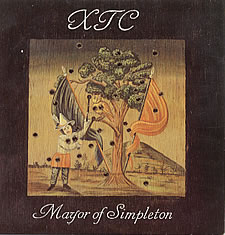| Look up simpleton in Wiktionary, the free dictionary. |
A simpleton is a stock character in folklore who lacks common sense.
In folklore, a simpleton is a person whose foolish actions are the subject of often-repeated stories. Simpletons are also known as noodles, fools, and gothamites. Folklore often holds, with no basis in fact, that certain towns or countries are thought to be home to large numbers of simpletons. The ancient Greeks told tales of stupid populations in Abdera and other cities; in Germany, men of Schilda are conspicuous in these stories; in Spain hundreds of jokes exist about the supposed foolishness of the people from Lepe; and in England, the village of Gotham in Nottinghamshire is reputed to be populated by simpletons. In Sri Lanka whole districts in the central, southern, and western provinces are credited with being the abode of foolish people.

Folklore is the expressive body of culture shared by a particular group of people; it encompasses the traditions common to that culture, subculture or group. These include oral traditions such as tales, proverbs and jokes. They include material culture, ranging from traditional building styles to handmade toys common to the group. Folklore also includes customary lore, the forms and rituals of celebrations such as Christmas and weddings, folk dances and initiation rites. Each one of these, either singly or in combination, is considered a folklore artifact. Just as essential as the form, folklore also encompasses the transmission of these artifacts from one region to another or from one generation to the next. Folklore is not something one can typically gain in a formal school curriculum or study in the fine arts. Instead, these traditions are passed along informally from one individual to another either through verbal instruction or demonstration. The academic study of folklore is called Folklore studies, and it can be explored at undergraduate, graduate and Ph.D. levels.

Common sense is sound practical judgment concerning everyday matters, or a basic ability to perceive, understand, and judge that is shared by nearly all people. The first type of common sense, good sense, can be described as "the knack for seeing things as they are, and doing things as they ought to be done." The second type is sometimes described as folk wisdom, "signifying unreflective knowledge not reliant on specialized training or deliberative thought." The two types are intertwined, as the person who has common sense is in touch with common-sense ideas, which emerge from the lived experiences of those commonsensical enough to perceive them.
Simpleton may also refer to:
- Simpleton (reggae musician) (1971–2004), Jamaican reggae artist
- The Simpleton , the 1850 debut novel of Alexei Pisemsky
- The Simpletons , shortened original title of Jude the Obscure
- The Simpleton (Messerschmidt), a sculpture by Franz Xaver Messerschmidt
Simpleton was a Jamaican reggae DJ whose claim to fame was the 1992 hit single,"Coca Cola Bottle Shape."
The Simpleton is the debut novel by Alexei Pisemsky, written in the late 1840 and first published in October and November 1850 by Moskvityanin. The novel has met critical acclaim and made Pisemsky a popular author.

The Simpleton is a sculpture bust by Franz Xaver Messerschmidt, one of the Character Heads.







